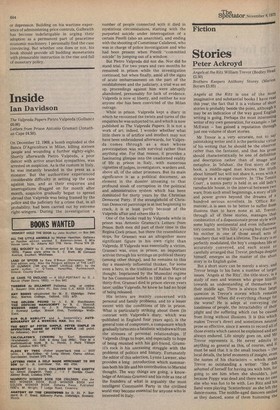Inside
Ian Davidson
The Valpreda Papers Pietro Valpreda (Gollancz £6.00) Letters from Prison Antonio Gramsci (Jonathan Cape £4.50).
On December 12, 1969, a bomb exploded at the Banca D'Agricoltura in Milan, killing sixteen people and wounding a further eighty-eight. Shortly afterwards Pietro Valpreda, a poor dancer with active anarchist sympathies, was arrested on suspicion. As is the custom in Italy, he was instantly branded in the press as a monster. But the authorities experienced considerable difficulty in setting up the case against him, and as their enquiries and interrogations dragged on for month after month, suspicion gradually began to spread abroad that Valpreda was being framed by the police and the judiciary for a crime that, in all probability, had been carried out by extreme right-wingers. During the investigation a number of people connected with it died in mysterious circumstances, starting with the purported suicide under interrogation of a certain Pinelli (also an anarchist), and ending with the shooting of Commissar Calabresi, who was in charge of police investigation and who had been present when Pinelli "committed suicide" by jumping out of a window.
But Pietro Valpreda did not die. Nor did he stand trial. For two years and two months he remained in prison while the investigation continued, but when finally, amid all the signs of acute embarrassment on the part of the establishment and the judiciary, a trial was set up, proceedings against him were abruptly abandoned, presumably for lack of evidence. Valpreda is now at liberty, and neither he nor anyone else has been convicted of the Milan outrage.
While in prison, Valpreda kept a diary in which he recounted the twists and turns of the enquiries he was subjected to, and which is now published as The Valpreda Papers. It is not a work of art; indeed, I wonder whether what little there is of artifice and intellect may not have been embroidered afterwards, for Valpreda comes through as a man whose preoccupation was with survival rather than anything else. For that reason, it provides a fascinating glimpse into the unadorned reality of life in prison in Italy, with numerous vignettes of judges, investigators, warders and, above all, of the other prisoners. But its main significance is as a political document, an element in the dossier attesting to that profound steak of corruption in the political and administrative system which has been dominated for thirty years by the Christian Democrat Party. If the stranglehold of Christian Democrat patronage is at last beginning to crack, it is at least partly because of the Valpreda affair and others like it.
One of the books read by Valpreda while in prison was Antonio Gramsci's Letters from Prison. Both men did part of their time in the Regina Coeli prison, but there the resemblance stops, for Gramsci was an altogether more significant figure in his own right than Valpreda. If Valpreda was essentially a victim, Gramsci was, even in prison, an important activist through his writings on political theory (among other things), and he remains to this day a massively influential thinker, for some even a hero, in the tradition of Italian Marxist thought. Imprisoned by the Mussolini regime for his Communist beliefs in 1926 at the age of thirty-five, Gramsci died in prison eleven years later; unlike Valpreda, he knew he had no hope of being released.
His letters are mainly concerned with personal and family problems, and to a lesser extent with the conditions of life in prison. What is particularly striking about them (in contrast with Valpreda's diary, which was --published in England four years ago), is the general tone of composure, a composure which gradually turns into a fatalistic withdrawal from the stresses of personal relationships. If Valpreda clings to hope, and especially to hope of being reunited with his girl-friend, Gramsci's rock is his unceasing struggle with the problems of politics and history. Fortunately the editor of this selection, Lynne Lawner, also provides a long introduction which summarises both his life and his contribution to Marxist thought. The way things are going, a knowledge of Antonio Gramsci and his role as one of the founders of what is arguably the most intelligent Communist Party in the civilised world may become essential for anyone who is interested in Italy.
































 Previous page
Previous page